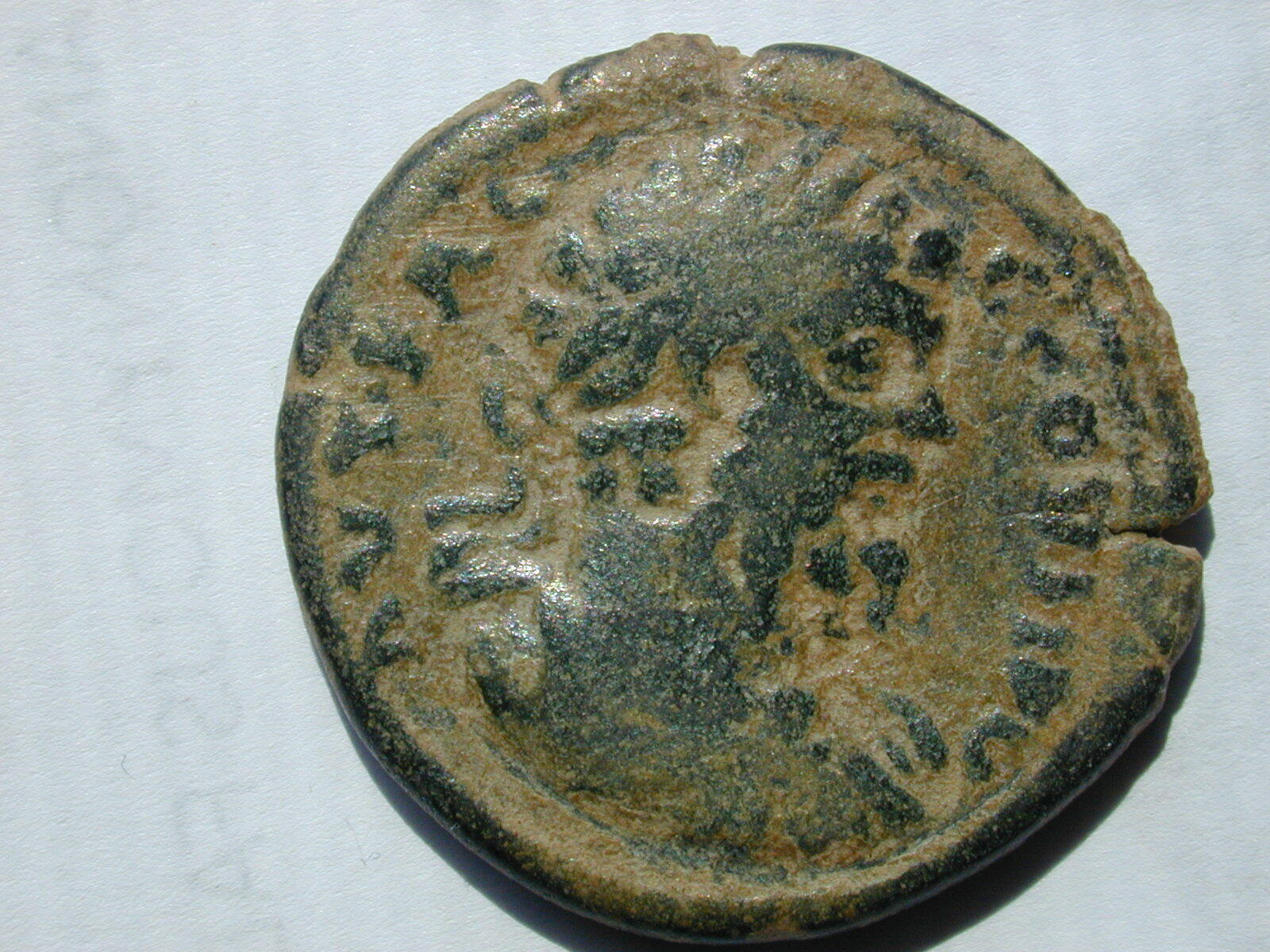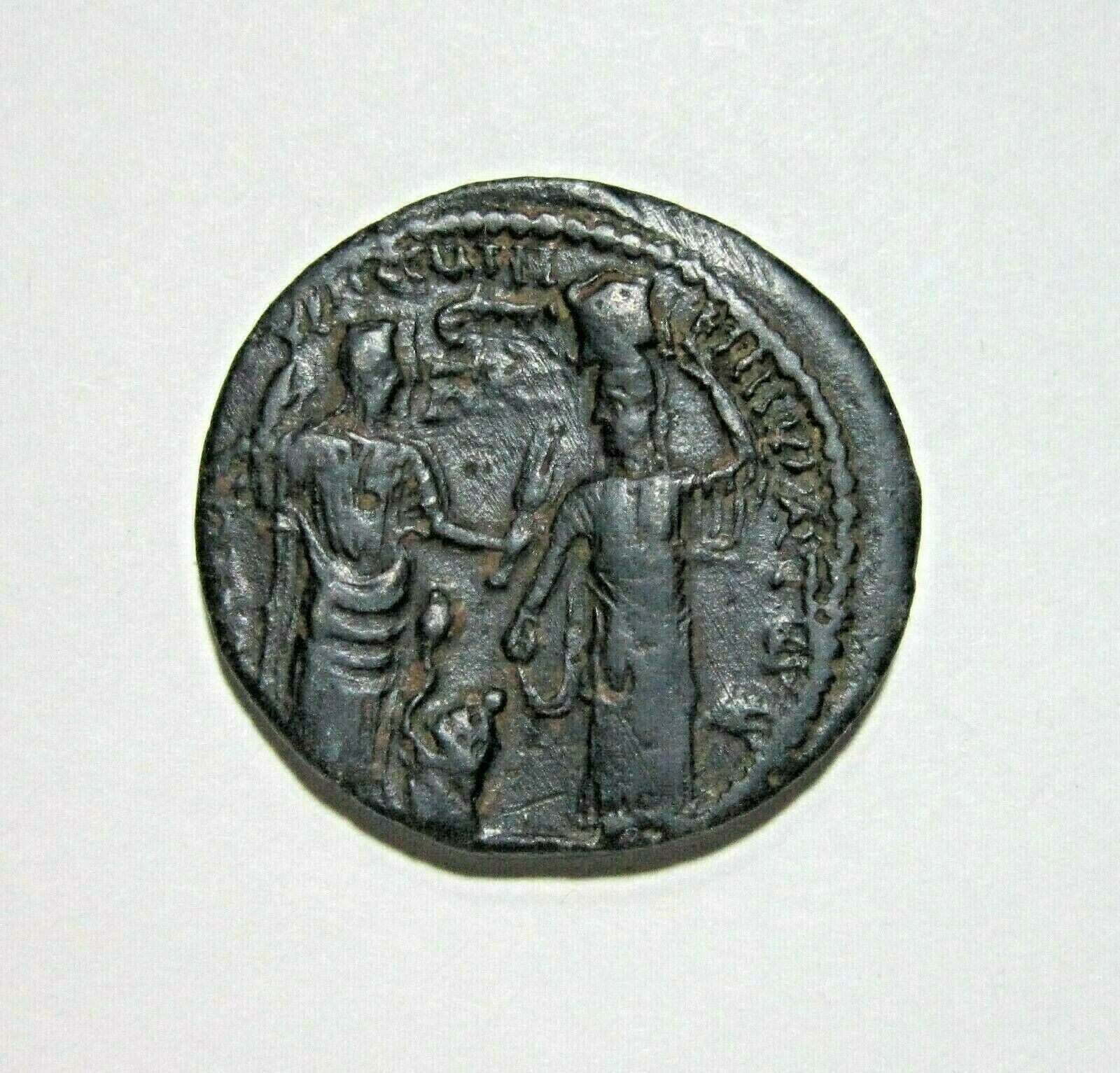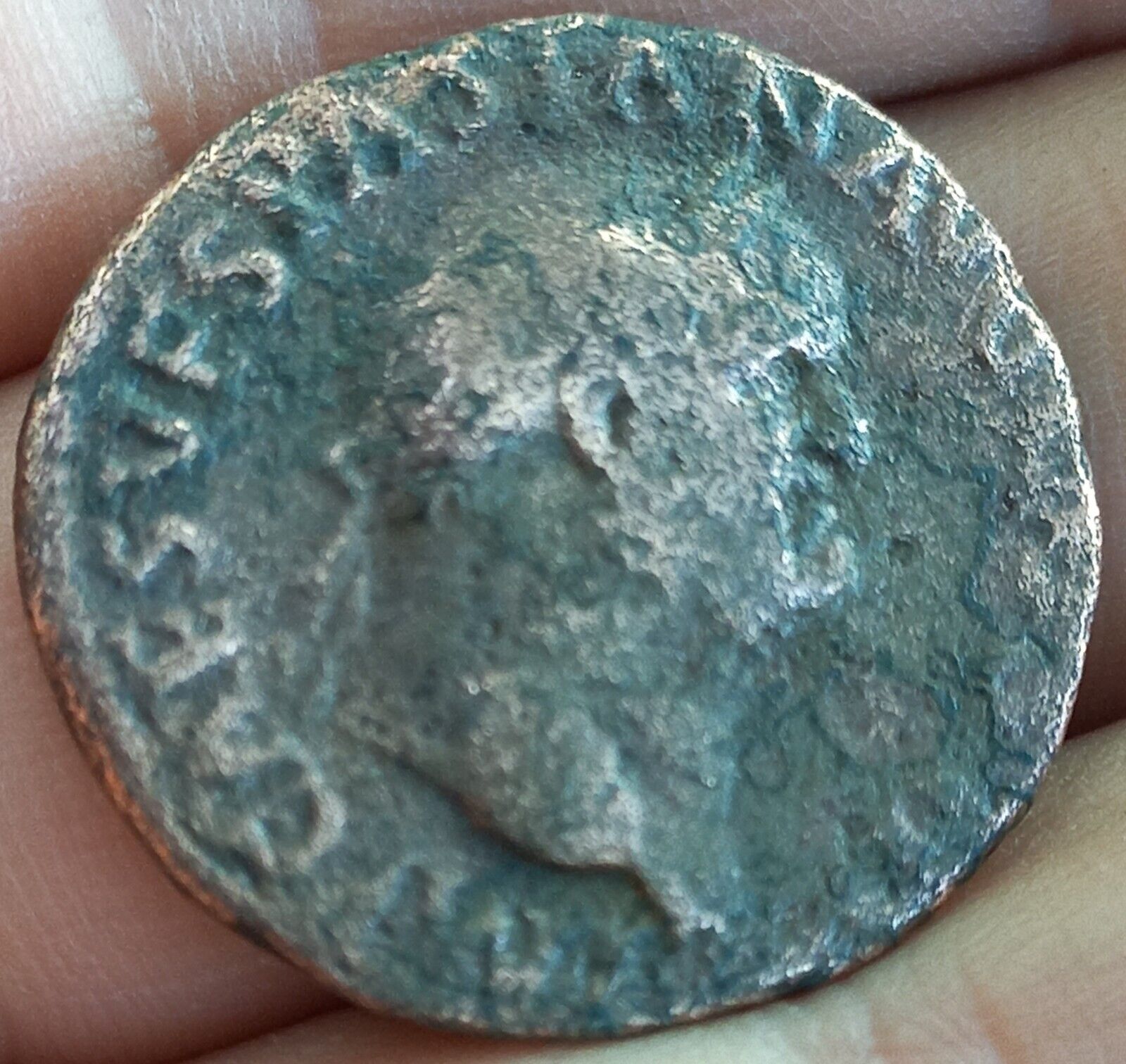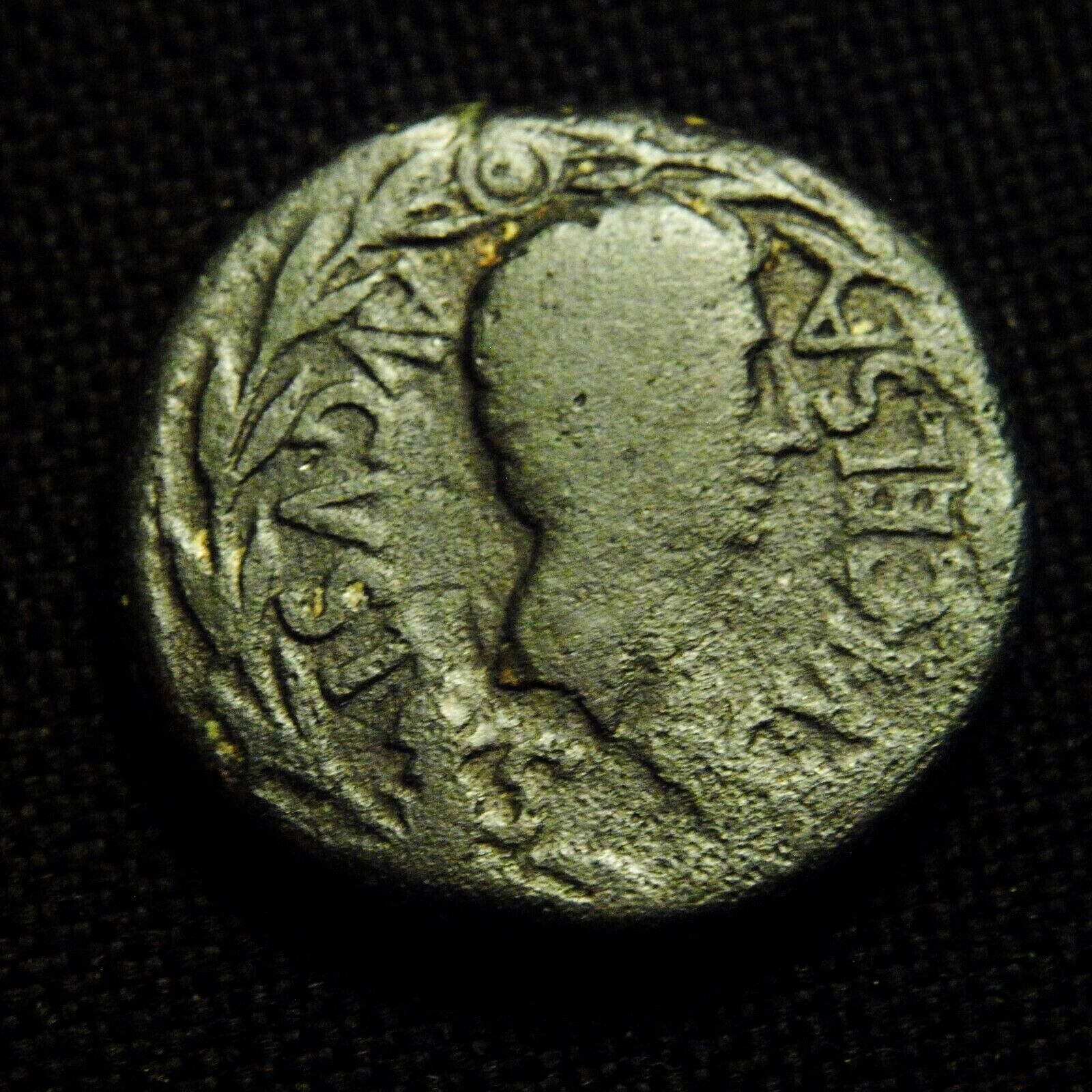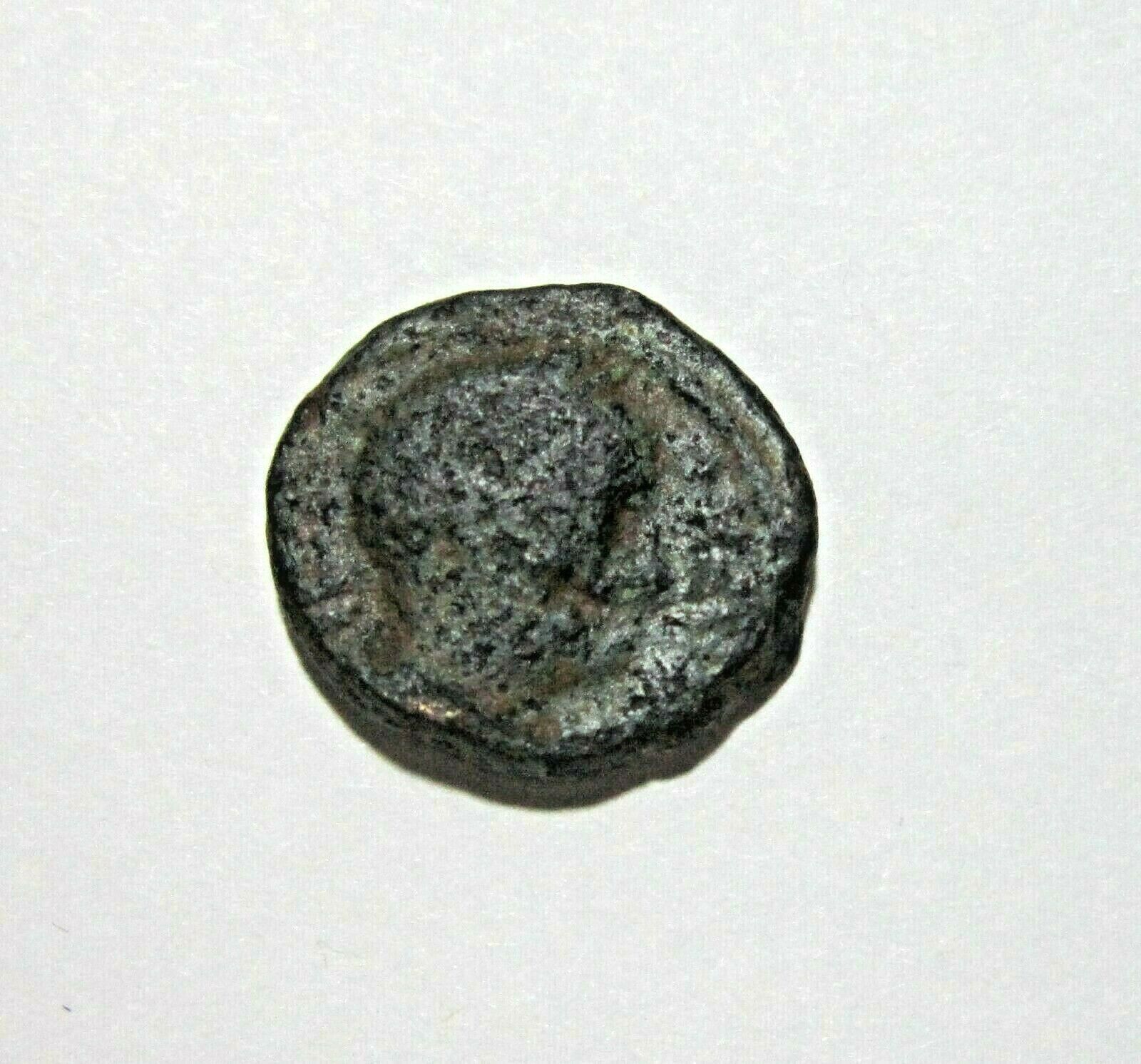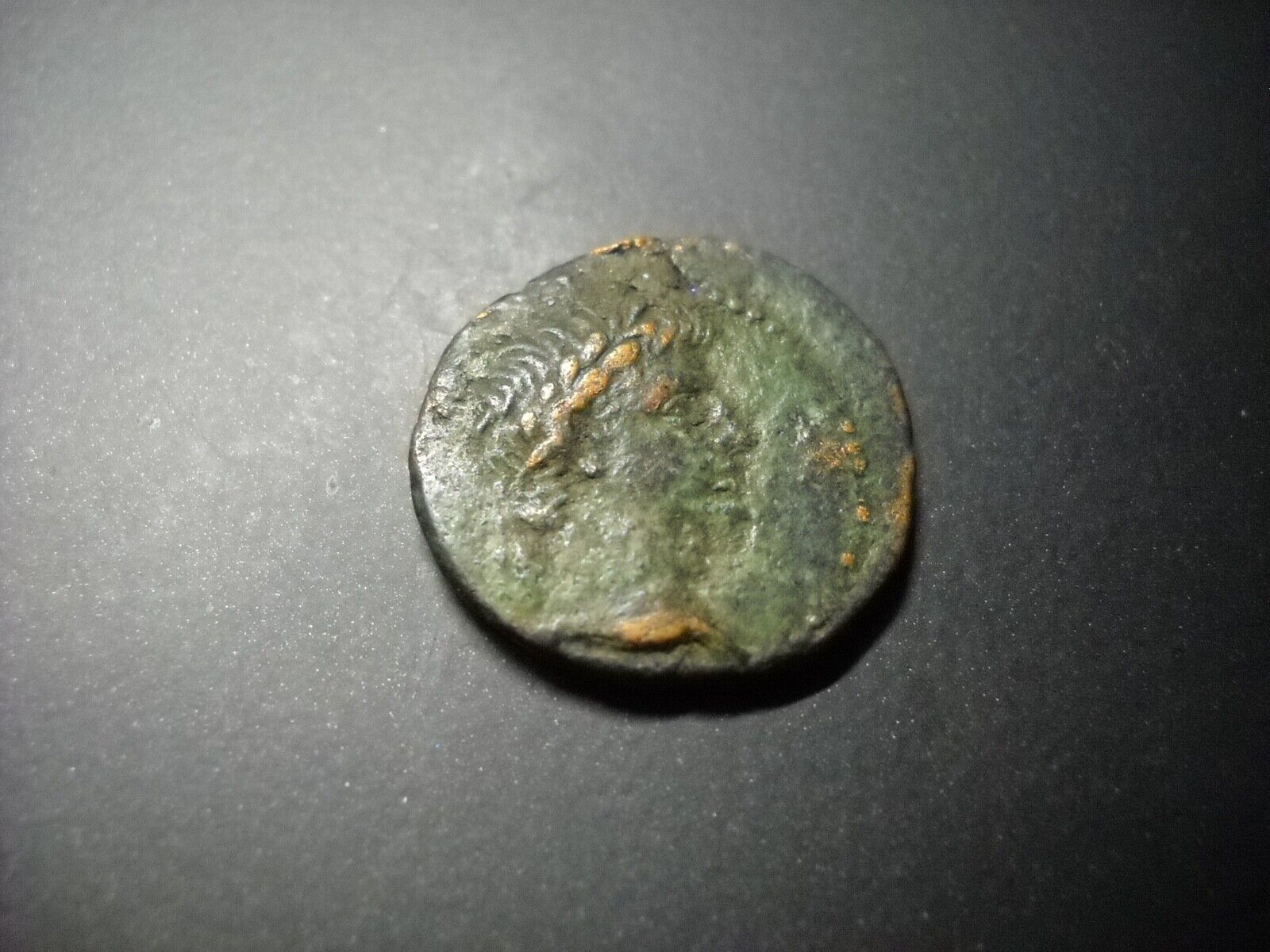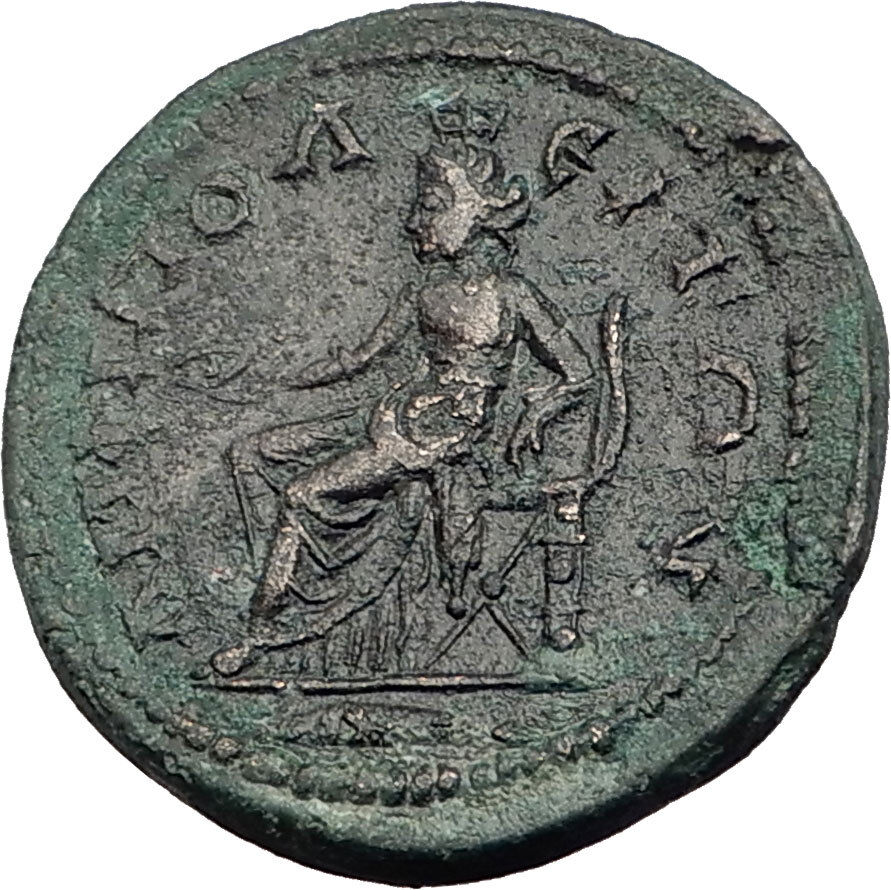-40%
CARACALLA Rare Ancient Roman Coin Grapes Dionysus Bacchus Ritual madness i48552
$ 26.4
- Description
- Size Guide
Description
Item:i48552
Authentic Ancient Coin of:
Caracalla
-
Roman Emperor
: 198-217 A.D. -
Bronze 17mm (3.16 grams) Struck at the Roman provincial mint
Bare-headed, draped and cuirassed bust right.
Bunch of grapes, associated with
Dionysus.
You are bidding on the exact item pictured, provided with a Certificate of Authenticity and Lifetime Guarantee of Authenticity.
Dionysus
is the god of the grape harvest, winemaking and wine, of ritual madness, fertility, theatre and religious ecstasy in
Greek mythology
. Alcohol, especially
wine
, played an important role in Greek
culture with Dionysus being an important reason for this life style. His name, thought to be a
theonym
in
Linear B
tablets as
di-wo-nu-so
(
KH
Gq 5 inscription), shows that he may have been worshipped as early as c. 1500–1100 BC by
Mycenean Greeks
; other traces of the Dionysian-type cult have been found in ancient
Minoan Crete
. His origins are uncertain, and his cults took many forms; some are described by ancient sources as Thracian, others as Greek. In some cults, he arrives from the east, as an Asiatic foreigner; in others, from
Ethiopia
in the South. He is a god of
epiphany
, "the god that comes", and his "foreignness" as an arriving outsider-god may be inherent and essential to his cults. He is a major, popular figure of
Greek mythology
and
religion
, and is included in some lists of the
twelve Olympians
. Dionysus was the last god to be accepted into Mt. Olympus. He was the youngest and the only one to have a mortal mother. His festivals were the driving force behind the development of
Greek theatre
. He is an example of a
dying god
.
The earliest cult images of Dionysus show a mature male, bearded and robed. He holds a
fennel
staff, tipped with a pine-cone and known as a
thyrsus
. Later images show him as a beardless, sensuous, naked or half-naked androgynous youth: the literature describes him as womanly or "man-womanish". In its fully developed form, his central cult imagery shows his triumphant, disorderly arrival or return, as if from some place beyond the borders of the known and civilized. His procession
(
thiasus
)
is made up of wild female followers (
maenads
) and bearded
satyrs
with
erect penises
. Some are armed with the
thyrsus
, some dance or play music. The god himself is drawn in a chariot, usually by exotic beasts such as lions or tigers, and is sometimes attended by a bearded, drunken
Silenus
. This procession is presumed to be the cult model for the human followers of his
Dionysian Mysteries
. In his
Thracian
mysteries, he wears the
bassaris
or
fox
-skin, symbolizing a new life. Dionysus is represented by city religions as the protector of those who do not belong to conventional society and thus symbolizes everything which is chaotic, dangerous and unexpected, everything which escapes human reason and which can only be attributed to the unforeseeable action of the gods.
Also known as
Bacchus
, the name adopted by the
Romans
and the frenzy he induces,
bakkheia
. His
thyrsus
is sometimes wound with ivy and dripping with honey. It is a beneficent wand but also a weapon, and can be used to destroy those who oppose his cult and the freedoms he represents. He is also called
Eleutherios
("the liberator"), whose wine, music and ecstatic dance frees his followers from self-conscious fear and care, and subverts the oppressive restraints of the powerful. Those who partake of his mysteries are possessed and empowered by the god himself. His cult is also a "cult of the souls"; his maenads feed the dead through blood-offerings, and he acts as a divine communicant between the living and the dead.
In Greek mythology, he is presented as a son of
Zeus
and the mortal
Semele
, thus semi-divine or
heroic
: and as son of Zeus and
Persephone
or
Demeter
, thus both fully divine, part-
chthonic
and possibly identical with
Iacchus
of the
Eleusinian Mysteries
. Some scholars believe that Dionysus is a
syncretism
of a local Greek nature deity and a more powerful god from
Thrace
or
Phrygia
such as
Sabazios
or
Zalmoxis
.
Antoninus (Called 'Caracalla')
Caesar: 195-198 A.D.
Augustus: 198-217 A.D.
( 198-209 A.D. - with Septimius Severus)
( 209-211 A.D. - with Septimius Severus and Geta)
( 211-217 A.D. - Sole Reign)
Caracalla
(
April 4
,
188
–
April 8
,
217
. Caracallus ), born
Lucius Septimius Bassianus
and later called
Marcus Aurelius Antoninus
and
Marcus Aurelius Severus Antoninus
, was the eldest son of
Septimius Severus
and
Roman Emperor
from 211 to 217. He was one of the most nefarious of Roman emperors. Caracalla's reign was notable for:
the
Constitutio Antoniniana
, granting
Roman citizenship
to freemen throughout the
Roman Empire
, according to
Cassius Dio
in order to increase taxation;
debasing the silver content in Roman coinage by 25 percent in order to pay the legions; and
the construction of a large
thermae
outside Rome, the remains of which, known as the
Baths of Caracalla
, can still be seen today
"Caracalla was the common enemy of all mankind," wrote
Edward Gibbon
. He spent his reign traveling from province to province so that each could experience his "rapine and cruelty."
Caracalla's real name was Marcus Aurelius Antoninus. He got the nickname from his habit of wearing a cloak by the same name. Caracalla was the elder son of Septimius Severus and brother of Geta whom he positively hated. Hated so much, in fact, that he had him murdered a few years later. In the mayhem that followed, Caracalla's men went on a killing spree of anyone suspected of being a Geta sympathizer. In the massacre, it's estimated up to 20,000 people lost their lives. Caracalla would go on to rule for another five years but his bad karma caught up with him and he was assassinated in a plot perpetrated by Macrinus.
As an emperor Caracalla possessed few redeeming qualities and among the worst of them would be his ruinous drain on the treasury. Because he knew everyone hated him he sought the protection of the army. And the surest way of getting this protection was to buy it outright. He raised the pay of the solider to about four denarii per day, nearly quadrupling the salary of just a few years prior. And on top of their regular salary he heaped endless bonuses and other concessions meant to endear them. This money could only have come by the oppressive taxation of ordinary citizens as well as the seizures of property of the wealthy under trumped-up charges. This not only intensified the hatred against him but also had the effect of corrupting the military who had become accustomed to this life of luxury and throwing the economy into lasting disarray.
Rise to power
Caracalla, of mixed
Punic
/
Berber
and
Syrian
Arab
descent, was born Lucius Septimius Bassianus in
Lugdunum
,
Gaul
(now
Lyon
,
France
), the son of the later Emperor Septimius Severus and
Julia Domna
. At the age of seven, his name was changed to Marcus Aurelius Septimius Bassianus Antoninus to solidify connection to the family of
Marcus Aurelius
. He was later given the
Caracalla
nickname
, which referred to the Gallic hooded tunic he habitually wore and which he made fashionable.
His father, who had taken the imperial throne in 193, died in 211 while touring the northern marches at
Eboracum
(
York
), and Caracalla was proclaimed co-emperor with his brother
Publius Septimius Antoninius Geta
. However since both of them wanted to be the sole ruler, tensions between the brothers were evident in the few months they ruled the empire together (they even considered dividing the empire in two, but were persuaded not to do so by their mother). In December 211, Caracalla had Geta, the family of his former father-in-law
Gaius Fulvius Plautianus
, his wife
Fulvia Plautilla
(also his paternal second cousin), and her brother assassinated. He persecuted Geta's supporters and ordered a
damnatio memoriae
by the Senate against his brother.
Reign
In 213 Caracalla went north to the German frontier to deal with the
Alamanni
who were causing trouble in the
Agri Decumates
. The emperor managed to win the sympathy of the soldiers with generous pay rises and popular gestures, like marching on foot among the ordinary soldiers, eating the same food, and even grinding his own flour with them.
Caracalla defeated the Alamanni in a battle near the river
Main
, but failed to win a decisive victory over them. After a peace agreement was brokered, the senate conferred upon him the title "Germanicus Maximus". In the next year the emperor traveled to the East.
When the inhabitants of
Alexandria
heard Caracalla's claims that he had killed Geta in self-defense, they produced a satire mocking this claim, as well as Caracalla's other pretensions. Caracalla responded to this insult savagely in 215 by slaughtering the deputation of leading citizens who had unsuspectingly assembled before the city to greet his arrival, and then unleashed his troops for several days of looting and plunder in Alexandria. According to historian Cassius Dio, over 20,000 people were killed.
During his reign as emperor, Caracalla raised the annual pay of an average legionary to 675
denarii
and lavished many benefits on the army which he both feared and admired, as instructed by his father Septimius Severus who had told him to always mind the soldiers and ignore everyone else. His official portraiture marked a break with the detached images of the philosopher-emperors who preceded him: his close-cropped haircut is that of a soldier, his pugnacious scowl a realistic and threatening presence. The rugged soldier-emperor iconic type was adopted by several of the following emperors who depended on the support of the legions, like
Trebonianus Gallus
.
[11]
Seeking to secure his own legacy, Caracalla also commissioned one of Rome's last major architectural achievements, the
Baths of Caracalla
, the largest public bath ever built in ancient Rome. The main room of the baths was larger than
St. Peter's Basilica
, and could easily accommodate over 2,000 Roman citizens at one time. The bath house opened in 216, complete with private rooms and outdoor tracks. Internally it was decorated with golden trim and mosaics.
The Roman Empire and its provinces in 210 AD
Fall
While travelling from
Edessa
to begin a war with
Parthia
, he was assassinated while urinating at a roadside near
Harran
on
April 8
,
217
by Julius Martialis, an officer in the imperial bodyguard.
Herodian
says that Martialis' brother had been executed a few days earlier by Caracalla on an unproven charge; Cassius Dio, on the other hand, says that Martialis was resentful at not being promoted to the rank of centurion. The escort of the emperor gave him privacy to relieve himself, and Martialis ran forward and killed Caracalla with a single sword stroke. He immediately fled on horseback, but was killed by a bodyguard archer.
[
needed
citation
]
Caracalla was succeeded by the Praetorian Prefect of the Guard,
Macrinus
, who almost certainly was part of the conspiracy against the emperor.
His nickname
According to
Aurelius Victor
in his
Epitome de Caesaribus
, the
cognomen
"Caracalla" refers to a Gallic
cloak
that Caracalla adopted as a personal fashion, which spread to his army and his court. Cassius Dio and the
Historia Augusta
[14]
agree that his nickname derived from his cloak, but do not mention its country of origin.
Caracalla and Geta by
Lawrence Alma-Tadema
. 1907.
Legendary king of Britain
Geoffrey of Monmouth
's legendary
History of the Kings of Britain
makes Caracalla a king of Britain, referring to him by his actual name "Bassianus", rather than the nickname Caracalla. After Severus's death, the Romans wanted to make Geta king of Britain, but the Britons preferred Bassianus because he had a British mother. The two brothers fought a battle in which Geta was killed, and Bassianus succeeded to the throne. He ruled until he was betrayed by his
Pictish
allies and overthrown by
Carausius
, who, according to Geoffrey, was a Briton, rather than the
Menapian
Gaul that he actually was.
Frequently Asked Questions
How long until my order is shipped?:
Depending on the volume of sales, it may take up to 5 business days for shipment of your order after the receipt of payment.
How will I know when the order was shipped?:
After your order has shipped, you will be left positive feedback, and that date should be used as a basis of estimating an arrival date.
After you shipped the order, how long will the mail take?
USPS First Class mail takes about 3-5 business days to arrive in the U.S., international shipping times cannot be estimated as they vary from country to country. I am not responsible for any USPS delivery delays, especially for an international package.
What is a certificate of authenticity and what guarantees do you give that the item is authentic?
Each of the items sold here, is provided with a Certificate of Authenticity, and a Lifetime Guarantee of Authenticity, issued by a world-renowned numismatic and antique expert that has identified over 10000 ancient coins and has provided them with the same guarantee. You will be quite happy with what you get with the COA; a professional presentation of the coin, with all of the relevant information and a picture of the coin you saw in the listing.
Compared to other certification companies, the certificate of authenticity is a -50 value. So buy a coin today and own a piece of history, guaranteed.
Is there a money back guarantee?
I offer a 30 day unconditional money back guarantee. I stand behind my coins and would be willing to exchange your order for either store credit towards other coins, or refund, minus shipping expenses, within 30 days from the receipt of your order. My goal is to have the returning customers for a lifetime, and I am so sure in my coins, their authenticity, numismatic value and beauty, I can offer such a guarantee.
Is there a number I can call you with questions about my order?
You can contact me directly via ask seller a question and request my telephone number, or go to my About Me Page to get my contact information only in regards to items purchased on eBay.
When should I leave feedback?
Once you receive your order, please leave a positive. Please don't leave any negative feedbacks, as it happens many times that people rush to leave feedback before letting sufficient time for the order to arrive. Also, if you sent an email, make sure to check for my reply in your messages before claiming that you didn't receive a response. The matter of fact is that any issues can be resolved, as reputation is most important to me. My goal is to provide superior products and quality of service.




